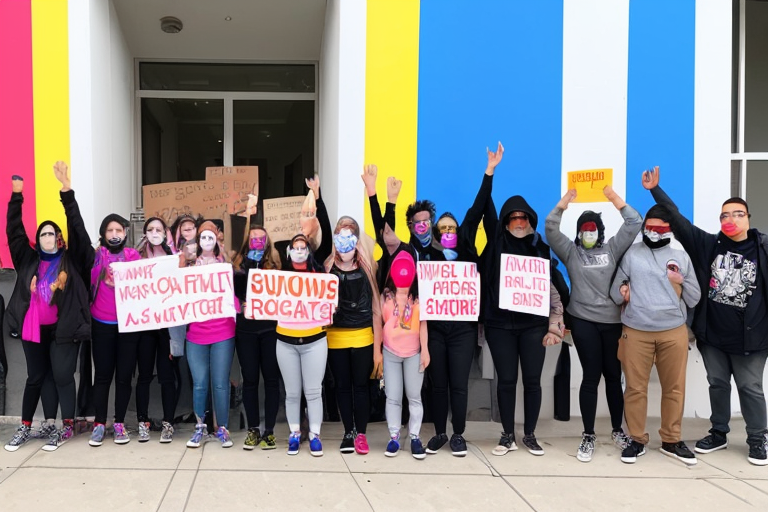The Power of Youth Activism
When I was in high school, I was passionate about a lot of things, but I never thought that my voice could make a difference in the world. It wasn’t until I attended a protest against police brutality that I realized the power of youth activism. I saw young people from all walks of life come together to demand change, and it was inspiring. That experience ignited a fire in me, and I became more involved in political activism.
I’m not alone in this experience. In recent years, we’ve seen a rise in youth activism across the world. From the March for Our Lives movement to the Sunrise Movement, young people are taking a stand and demanding change. But why is this happening now?
There are a few reasons for the rise of youth activism. First, young people are more politically engaged than ever before. According to a study by the Pew Research Center, 58% of young people aged 18-29 voted in the 2020 presidential election, the highest turnout in decades. This increased political engagement has led to more young people getting involved in activism.
Second, young people are facing a world that is increasingly uncertain and unstable. Climate change, economic inequality, and political polarization are just a few of the issues that young people are grappling with. As a result, many are turning to activism as a way to make a difference and create a better future.
But why is it important for young people to be involved in politics and activism? The answer is simple: young people are the future. They will inherit the world that we leave behind, and it’s important that they have a say in how it’s shaped. Additionally, young people bring fresh perspectives and new ideas to the table. They are often more willing to challenge the status quo and push for change.
In the next section, we’ll explore some of the different forms that youth activism can take and how young people are making their voices heard.
Ways for Young People to Get Involved in Politics and Activism
There are many ways for young people to get involved in politics and activism, and it’s important to find the method that works best for you. Here are some examples of ways that young people can make a difference:
-
Organizing and participating in protests and rallies: Protests and rallies are a powerful way to make your voice heard and bring attention to important issues. Whether you’re organizing your own event or joining an existing one, it’s important to do your research and plan ahead to ensure that your message is clear and your event is safe.
-
Using social media to spread awareness and pressure elected officials: Social media can be a powerful tool for activism, allowing you to connect with like-minded individuals and spread your message to a wider audience. Whether you’re sharing news articles, posting your own content, or engaging with elected officials directly, social media can be a great way to make your voice heard.
-
Working on campaigns and running for office: If you’re interested in politics, working on a campaign or running for office yourself can be a great way to make a difference. Whether you’re volunteering your time or running for a local office, there are many ways to get involved and make a difference in your community.
One example of a young person making a difference through activism is Frank, a high school student who organized a protest in his hometown to demand action on climate change. Despite facing pushback from local officials and community members, Frank was able to rally support and draw attention to the issue. His efforts ultimately led to changes in local policy and increased awareness of the importance of addressing climate change.
Another example is Uvanni, a college student who used social media to pressure her elected officials to support gun control legislation. Through her online activism, Uvanni was able to connect with other young people and build a movement that ultimately led to changes in state and federal policy.
Of course, getting involved in politics and activism can be challenging, and there are many obstacles that young people may face. Some common challenges include pushback from those in power, a lack of funding and resources, and burnout and stress.
Despite these challenges, however, it’s important to remember that young people have the power to make a difference. By finding the method of activism that works best for you and staying committed to your cause, you can help create a better future for yourself and your community.
The Impact of Youth-Led Activism Movements
Youth-led activism movements have been instrumental in bringing about change in society. From gun control to climate change, young people have been at the forefront of some of the most significant social and political movements of our time. In this section, we will explore some of the most prominent youth activists and their causes, as well as the impact they have had on policy and public opinion.
One of the most well-known youth activists is Greta Thunberg, a Swedish environmental activist who gained international recognition for her work on climate change. At just 15 years old, Thunberg began skipping school to protest outside the Swedish parliament, demanding that the government take action on climate change. Her activism sparked a global movement, with young people around the world joining her in protests and rallies. Thunberg’s advocacy has led to significant policy changes, including the adoption of the Paris Agreement and the European Union’s Green Deal.
Another young activist who has made a significant impact is Malala Yousafzai, a Pakistani activist for female education. Yousafzai gained international attention after surviving an assassination attempt by the Taliban for her advocacy work. She has since become a global advocate for education, co-founding the Malala Fund to promote girls’ education around the world. Yousafzai’s activism has led to policy changes in Pakistan and other countries, including increased funding for education and the passage of laws protecting girls’ rights.
In the United States, young people have been at the forefront of the fight for gun control. In the aftermath of the Parkland school shooting in 2018, a group of students from Marjory Stoneman Douglas High School organized the March for Our Lives, a nationwide protest calling for stricter gun laws. The movement gained widespread support, with hundreds of thousands of people participating in marches and rallies across the country. The students’ activism led to significant policy changes, including the passage of gun control legislation in several states.
One young activist who has made a significant impact on the legal system is Mari Copeny, also known as “Little Miss Flint.” Copeny gained national attention for her advocacy work on behalf of the residents of Flint, Michigan, who were affected by the city’s water crisis. She has met with elected officials, testified before Congress, and organized rallies and protests to demand action on the issue. Copeny’s activism led to a federal judge ruling that the state of Michigan must provide bottled water to residents of Flint, a significant victory for the youth-led movement.
Frankie, a young activist from New York City, has also made a significant impact through her work organizing protests and rallies. She has been a vocal advocate for racial justice and police reform, working closely with other young activists to demand change. Frankie’s activism has led to increased awareness of these issues and has put pressure on elected officials to take action.
Finally, there are countless young people who have followed in the footsteps of their activist parents and become leaders in their own right. One such example is Martin Luther King III, the son of civil rights leader Martin Luther King Jr. King III has continued his father’s work, advocating for racial justice and civil rights through his activism and advocacy work.
These young activists and many others like them have had a significant impact on policy and public opinion. Their advocacy has led to policy changes, increased awareness of important issues, and inspired countless others to get involved in the fight for social and political change. As we move forward, it is clear that youth-led activism will continue to play a crucial role in shaping the future of our society.
Overcoming Obstacles: The Challenges Faced by Young Activists
Young activists are often met with numerous challenges that can make it difficult for them to achieve their goals. In this section, we’ll explore some of the most common obstacles that young activists face and provide advice on how to overcome them.
One of the most significant challenges that young activists face is pushback from those in power and detractors. When young people speak out against the status quo, they often face resistance from those who benefit from it. This can come in the form of criticism, harassment, and even threats. It’s essential for young activists to stay strong and not let the negativity get to them. They should surround themselves with supportive people who can provide encouragement and advice.
Another challenge that young activists face is a lack of funding and resources. Many young people don’t have the financial means to support their activism, and they may not have access to the resources they need to be effective. However, there are ways to overcome this challenge. Young activists can seek out grants and scholarships that can help fund their projects. They can also network with other activists and organizations to share resources and collaborate on projects.
Burnout and stress are also common challenges faced by young activists. Activism can be emotionally and physically draining, and it’s easy to become overwhelmed. It’s essential for young activists to practice self-care and take breaks when needed. They should prioritize their mental and physical health and not feel guilty for taking time off. It’s also helpful to have a support system in place, whether it’s friends, family, or a therapist.
Despite the challenges they face, young activists continue to make a significant impact on society. They are leading the way in advocating for change and inspiring others to do the same. It’s important to recognize their contributions and provide them with the support they need to continue their work.
Coping Skills and Advice for Aspiring Activists
Youth activism can be incredibly rewarding, but it can also be emotionally and mentally taxing. Activists often face pushback from those in power, detractors, and even their own communities. They may also struggle with a lack of funding and resources, as well as the stress of juggling activism with school, work, and personal life. To sustain their efforts and avoid burnout, young activists need to prioritize self-care and build a network of allies and supporters.
One of the most important things young activists can do is to take care of themselves. This means prioritizing rest, exercise, and healthy eating habits. It also means setting boundaries and learning to say no when necessary. Activists should not feel guilty for taking breaks or taking care of their own needs. In fact, taking care of oneself is crucial for sustaining activism in the long run.
Another important aspect of self-care is finding healthy ways to manage stress and emotions. Activists may experience a range of emotions, from anger and frustration to hope and inspiration. It is important to find healthy outlets for these emotions, such as journaling, talking to a trusted friend or mentor, or engaging in creative activities like art or music.
In addition to self-care, young activists should also focus on building a network of allies and supporters. This means connecting with other activists and organizations that share their values and goals. It also means reaching out to community leaders, elected officials, and other decision-makers to build relationships and advocate for change. Building a strong network of allies and supporters can help sustain activism efforts and provide a sense of community and support.
Networking can also help young activists access resources and funding. Many organizations offer grants and other forms of support for young activists, but these opportunities may not be widely advertised. By building relationships with other activists and organizations, young activists can learn about these opportunities and access the resources they need to sustain their efforts.
Finally, it is important for young activists to remember that change takes time and that setbacks are inevitable. Activism can be frustrating and discouraging, but it is important to stay focused on the long-term goal and celebrate small victories along the way. By prioritizing self-care, building a network of allies and supporters, and staying committed to their goals, young activists can make a real difference in their communities and beyond.









